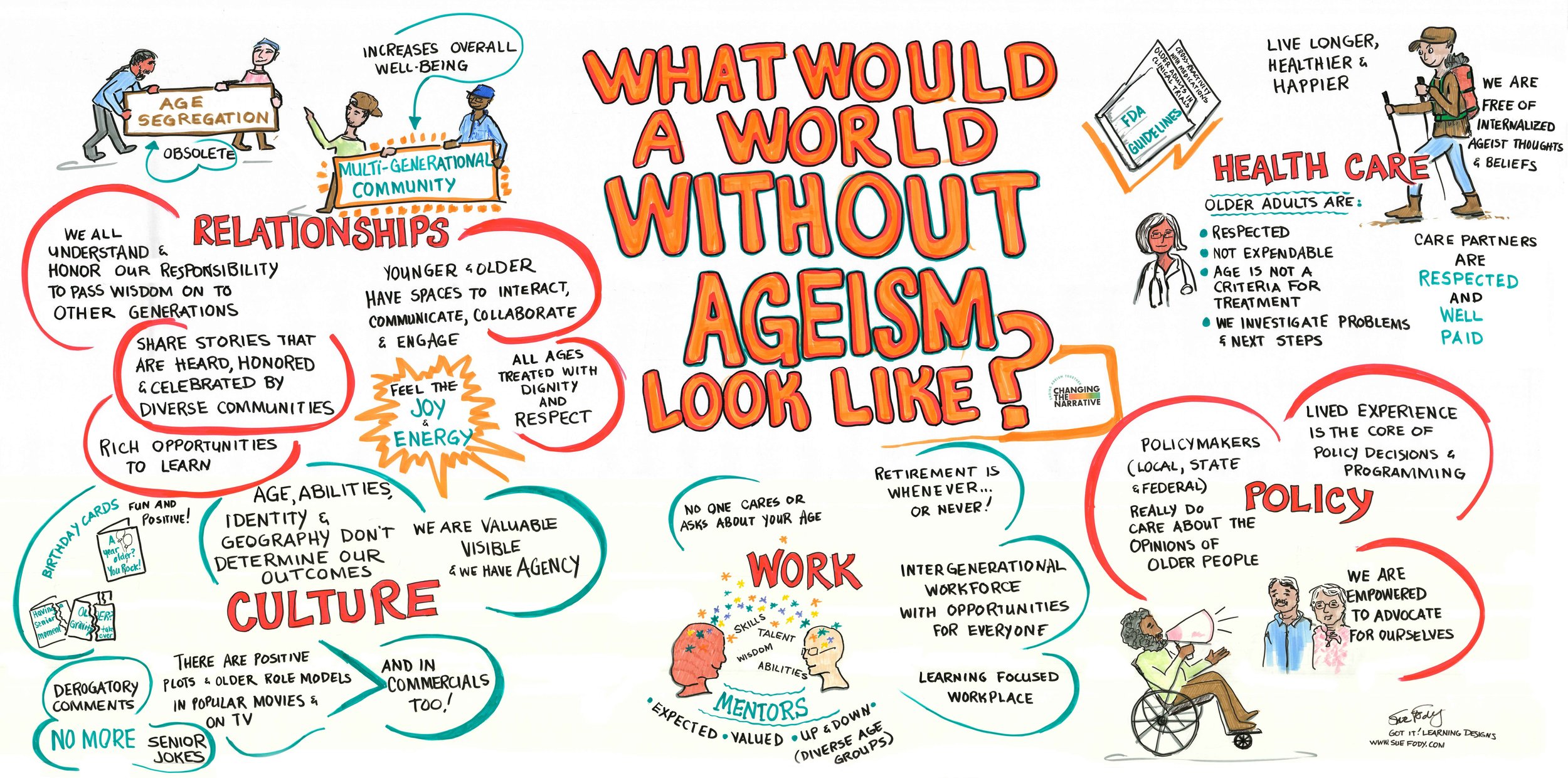Envisioning a World Without Ageism
Designer Sue Fody depicted the key themes that emerged from Changing The Narrative's "What would a world without ageism look like?"
What would a world without ageism look like?
A virtual “coffee chat” in December by Changing The Narrative, a Colorado-based campaign to change the way that people think, talk, and act in regards to aging, sought to answer that question. Participants broke out into groups and envisioned how work, media, healthcare, culture, policy and laws, and relationships would change if ageism was removed from society.
“We spend a lot of time talking about what isn’t working and what is wrong,” Janine Vanderberg, director and chief catalyst at Changing The Narrative said. “ I started thinking instead… That if we could start a vision of what that world that we were working toward looks like, then maybe we could be focused on what are the things that we need to do to get us in that positive direction.”
The visions attendees devised are not reflective of any one demographic, but rather of individuals with their own worldviews, interests, demographics, and experiences, who are interested in ending ageism. Below is a snapshot of what the group envisioned.
“Life experience would be valued.”
“We’d accept the aging process as a natural part of life.”
“Co-generational living opportunities are significantly increased, which has been proven to increase individuals’ overall wellbeing.”
“Doctors would pay attention and not assume problems simply due to age.”
“Opportunities for more intergenerational relationships across all sectors.”
“Lived experience would become a center of policy decisions and programming.”
“People, both younger and older, would be evaluated on skills and abilities rather than chronological age.”
“More spaces where younger people and older people interact, communicate, collaborate, and engage.”
“In pandemics and other public health crises, age is not the primary criteria for who receives treatment.”
“People would speak out when they feel oppressed or discriminated against.”
“Birthday cards would be less toxic.”
“Younger generations would honor and respect their elders, and elders would understand and honor their responsibility to pass wisdom on to younger generations.”
“Manufacturers of products would include older adults in decision-making—a seat at the table.”
“Movies would have positive plots that include older adults.”
“Older adults would feel empowered to advocate for themselves at the state and local levels of government.”
“No one would refer to me as ‘young lady.’”
“Less complaining about aches and pains.”
“Commercials would show older adults in a positive and strength-based way.”
Vanderberg shared a story of when she celebrated an ageism victory for the people of Connecticut: a bill that would ban employers from asking graduation dates and other age identifiers. She noted that folks were commenting on how there’s so much more work to be done, and that the bill “is not enough.”
This particular coffee chat offered an antidote to the lack mentality: getting as many wins out on the table as the group could imagine, so that each idea could be celebrated as it’s accomplished.
“If we know collectively this idea of what we're working toward, we can celebrate those incremental steps along the way,” Vanderberg said.
Changing The Narrative’s monthly coffee chats are designed to bring together “Change AGEnts,” or those who’ve committed to doing something, large or small, to help end ageism by signing the organization’s “Join The Movement” form. Coffee chats are held every third Wednesday of the month from 11 a.m. to 12 p.m. PST. Visit tinyurl.com/changeAGEntsmovement to sign the form.
To learn more about Changing The Narrative, visit changingthenarrativeco.org.

